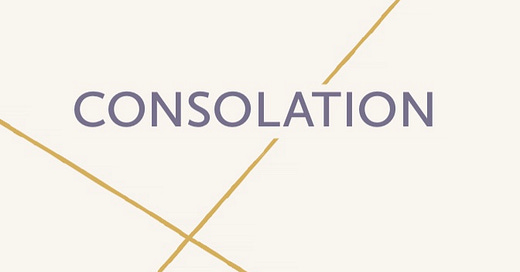When Amy and I launched this interview series, I knew I wanted to feature Deborah Shapiro not only because her latest novel, Consolation, is gorgeous, but also, it had an unconventional path to publication. Deborah’s first two novels, The Sun in Your Eyes and The Summer Demands, were published by William Morrow and Catapult, respectively. But when her agent couldn’t sell her third novel (a very common phenomenon that writers don’t talk much about), Deborah created her own imprint, B-Side Editions, and published it herself. Seriously, how cool is that?!
Consolation brings together three women who are each in different stages in their lives, all connected in some way to a recently deceased famous photojournalist— one is an old lover, one his aunt who helped raise him, and the other a younger ex-girlfriend (the couple broke up just before he died). All three women are coming to terms with grief, as well as the aging, if not in actuality, at least in concept. The prose is poetic and spellbinding, and reading this novel feels both nourishing and therapeutic.
I’m so happy Deborah agreed to chat with us.
Did you ever doubt this book would be published?
Yes and no. My two previous novels were published traditionally and when my agent sent this one out on submission, it was largely met with crickets. Or I was told it was “too quiet” or not my “breakout book.” Which is fair, I guess – it probably doesn’t have the mass appeal needed to be a “breakout.” To an extent, this novel is an exploration of subtle shifts of feeling and mysterious connections we don’t exactly have language or labels for. It’s not particularly easy to sum it up in an elevator pitch. But I hoped it would appeal to readers who could give it some time and attention (harder and harder to come by, I know).
In the past, I probably would have taken the reaction from the publishing industry more to heart, internalized it as a judgement on the quality of my writing. But over the years, I’ve developed a stronger belief in the kind of work that I do and I wanted this book to be out in the world. I got tired of waiting and waiting to hear something good and I needed to regain some sense of control, so I started B-Side Editions to put it out myself. It may have been a combination of the pandemic and just getting older, but I felt like: What am I waiting for? Whose permission?
The response from readers has been truly gratifying. And the support from indie bookstores has been incredible.
Do you have any tips or tricks for staying motivated?
I wish I had a good trick. I’ve often felt the most motivated when I’ve had certain conditions to push against, like a 9-5 office job, when I couldn’t wait to get home and get back to writing. But I’m fairly disciplined when it comes to being able to sit down and focus… once I have something beyond a blank page to focus on. I think what helps me is feeling challenged by the work, wrestling with questions, being curious, and interrogating why a situation or an experience or character is confusing or haunting or fascinating. And I like the puzzle-solving aspect, too – coming up with sentences and paragraphs that are satisfying, evocative, and effective, that do what they need to do. That searching, questioning process keeps me going as a writer.
Staying motivated throughout the publishing process – which is so different from the writing process – is tough. Like most of us, I think, I’ve had moments of feeling pretty alienated and wondering if I was delusional about what I was spending so much of my time and energy on. What helps is having community – other writers and readers who are receptive to what you’re doing and whose sensibility you value and trust. And that may just be a few people! But it’s so important.
Any reading recommendations?
There are so many great books out by writers I know and admire and I can’t list all of them here, so I’m going to recommend an older book that rewards re-reading: Turtle Diary by Russell Hoban, first published in 1975. It’s funny, sad, moving, unexpected – about loneliness and connection. And two strangers who decide to free sea turtles from a tank at the London Zoo. And grown adults who still don’t quite believe in their own agency or even their own existence. And it’s short. The NYRB Classics edition has a wonderful intro by Ed Park, who describes it as “a work of art that vibrates on a new frequency each time you read it, depending on the weather in your life.”
I also love the way Sara Lippmann (author of the novel Lech and the story collection Jerks, both so good) recently wrote about two new memoirs, Dispatches from Puerto Nowhere by Robert Lopez and by Still No Word from You by Peter Orner, in the Chicago Review of Books. It’s refreshing to read literary coverage that’s something other than a standard summary followed by a paragraph of critical judgement. Lippmann gives us a very good sense of these two books and engages with them while also getting at the way we read, how we actually experience books and how we experience ourselves as we read them. How we move through time in that way, essentially.
Thank you, Deborah!






This interview makes me so happy! Consolation is a perfect novel and the story of its publication an inspiration.